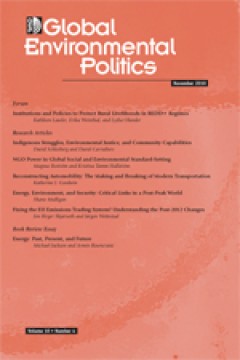Filter by

Organizational Determinants of Wage Moderation
This article contributes to the political economic literature regarding the effects of industrial relations institutions on national economic outcomes. Based on an econometric analysis of the determinants of wage moderation in sixteen industrialized countries between 1974 and 2000, it argues that the organizational characteristics of trade unions have a significant impact on wage dynamics. Cont…
- Edition
- Vol. 62, No. 4 October 2010.pp. 594-636
- ISBN/ISSN
- 00438871
- Collation
- -
- Series Title
- WORLD POLITICS
- Call Number
- -

Varieties of Electioneering: Success Contagion and Presidential Campaigns in …
Existing theories of change in campaign strategies predict cross-national convergence in candidates� linkages to voters and the degree of policy focus and cleavage priming in their appeals. However, the prevailing national patterns of electioneering in Chile, Brazil, and Peru have actually diverged from one another since their transitions from authoritarian rule. Based upon content analysis of …
- Edition
- Vol. 62, No. 4 October 2010.pp. 636-675
- ISBN/ISSN
- 00438871
- Collation
- -
- Series Title
- WORLD POLITICS
- Call Number
- -

Mobilizing Restraint: Economic Reform and the Politics of Industrial Protest …
The study draws on evidence from South Asia to explore how union partisan ties condition industrial protest in the context of rapid economic change. It argues that unions controlled by major political parties respond to the economic challenges of the postreform period by facilitating institutionalized grievance resolution and encouraging restraint in the collective bargaining arena. By contra…
- Edition
- Vol. 62, No. 4 October 2010.pp. 676-713
- ISBN/ISSN
- 00438871
- Collation
- -
- Series Title
- WORLD POLITICS
- Call Number
- -

Institutions and Policies to Protect Rural Livelihoods in REDD+ Regimes
While there is growing interest among researchers and practitioners concerning the risks that emerging REDD+ regimes pose to rural livelihoods, there has been little scholarly analysis of specific policies that could be applied to guard against these risks. We argue that for REDD+ regimes to avoid negative impacts on local populations, social safeguard policies will need to overcome the signifi…
- Edition
- Vol. 10, No. 4,November 2010. Pages 1-11
- ISBN/ISSN
- 15263800
- Collation
- -
- Series Title
- Global Environmental Politics
- Call Number
- -

Indigenous Struggles, Environmental Justice, and Community Capabilities
Environmental justice is often defined in terms of the distribution (or maldistribution) of environmental goods and bads. Activists and scholars have also focused on issues of cultural recognition and political participation. This article posits a capabilities-based conception of environmental justice. We argue that environmental challenges raised by indigenous communities demonstrate a broad, …
- Edition
- Vol. 10, No. 4, November 2010. Pages 12-35
- ISBN/ISSN
- 15263800
- Collation
- -
- Series Title
- Global Environmental Politics
- Call Number
- -

NGO Power in Global Social and Environmental Standard-Setting
We have seen a worldwide increase in new nonstate, multi-stakeholder organizations setting standards for socially and environmentally responsible behavior. These standard-setting arenas offer new channels for political participation for NGOs. Scholars have drawn attention to the rise and the role of NGOs in global politics, but there is less research on the power and long-term implications of N…
- Edition
- Vol. 10, No. 4, November 2010, Pages 36-59
- ISBN/ISSN
- 15263800
- Collation
- -
- Series Title
- Global Environmental Politics
- Call Number
- -

Reconstructing Automobility: The Making and Breaking of Modern Transportation
Automobility, the global system of human movement built around petroleumfueled cars, clearly has significant negative environmental consequences. Yet transforming this system presents a nearly overwhelming technological, cultural, and political challenge. The production of oil and cars is fundamental to modern capitalism and is a source of geopolitical power, while the consumption of these good…
- Edition
- Vol. 10, No. 4, November 2010, Pages 60-78
- ISBN/ISSN
- 15263800
- Collation
- -
- Series Title
- Global Environmental Politics
- Call Number
- -

Energy, Environment, and Security: Critical Links in a Post-Peak World
Energy supplies are central to human ecology and key to the sustainability of human communities, but the decline of fossil fuel resources is largely ignored in global environmental politics. Most political analysis of energy focuses on state-centered �energy security� while largely overlooking discourses of environmental or ecological security. Yet energy and the environment are intimately conn…
- Edition
- Vol. 10, No. 4, November 2010. Pages 79-100
- ISBN/ISSN
- 15263800
- Collation
- -
- Series Title
- -
- Call Number
- -

Fixing the EU Emissions Trading System? Understanding the Post-2012 Changes
This article explains why the significant changes in the EU Emissions Trading System (EU ETS) for the 2013�2020 phase were adopted in 2008. The combination of a more stringent EU-wide cap, allocation of emission allowances for payment, and limits on imports of credits from third countries have strengthened the system for the post-2012 period. This will promote reduction in greenhouse gases comp…
- Edition
- Vol. 10, No. 4, November 2010. Pages 101-123
- ISBN/ISSN
- 15263800
- Collation
- -
- Series Title
- Global Environmental Politics
- Call Number
- -

Challenging gender inequality in farmers' organisations in Nicaragua
Research into rural livelihoods shows that food security will not be achieved unless women farmers are treated as economic agents in their own right. While farmers often seek to increase their influence through collective action, this avenue is only of limited use to women, since most rural organisations are male-dominated and marginalise women's voices. This article looks at the National Feder…
- Edition
- Volume 18, Issue 3. November 2010, pages 373 - 38
- ISBN/ISSN
- 13552074
- Collation
- -
- Series Title
- Gender & Development
- Call Number
- -

Agricultural livelihoods and nutrition - exploring the links with women in Za…
This article examines food security, nutrition, and women's agricultural livelihoods in Western Province, Zambia. It draws on data from field research supported by Concern Worldwide UK. The research aimed to explore links between food procurement, livelihoods and care at the household level, and recognises the role of institutions and access to assets in shaping livelihood choices by women. Wom…
- Edition
- Volume 18, Issue 3 November 2010 , pages 387 - 409
- ISBN/ISSN
- 13552074
- Collation
- -
- Series Title
- Gender & Development
- Call Number
- -

Transforming gender in homestead food production
In Bangladesh, Helen Keller International (HKI) is known for its homestead food production (HFP) programme, which promotes small-scale agriculture among women, specifically to improve women's and children's nutrition outcomes, including dietary diversity and knowledge of maternal self-care and infant-young child feeding practices. To achieve these aims, the programme focuses on women's empowerm…
- Edition
- Volume 18, Issue 3 November 2010 , pages 411 - 425
- ISBN/ISSN
- 13552074
- Collation
- -
- Series Title
- Gender & Development
- Call Number
- -

Maize diversity and gender: research from Mexico
In the future, more food will be needed to feed a growing world population. High-yielding crop varieties will play a key role in meeting this challenge. This article draws on research undertaken by the International Maize and Wheat Improvement Center in La Frailesca in the southern Mexican state of Chiapas. Both agricultural and social processes influence women's and men's preferences for new o…
- Edition
- Volume 18, Issue 3 November 2010 , pages 427 - 437
- ISBN/ISSN
- 13552074
- Collation
- -
- Series Title
- Gender & Development
- Call Number
- -

The nutrition transition: a gender perspective with reference to Brazil
The concept of the 'nutrition transition' is widely used to explain the recent, rapid rise in overweight and obesity, and the co-existence of under- and over-nutrition, in low-income populations in 'middle-income' developing countries. This article provides an overview of the changes occurring in diets, physical activity, and nutritional status among children and adults in nutrition transition …
- Edition
- Volume 18, Issue 3 November 2010 , pages 439 - 452
- ISBN/ISSN
- 13552074
- Collation
- -
- Series Title
- Gender & Development
- Call Number
- -

Gender, large-scale development, and food insecurity in Lesotho: an analysis …
This article investigates the effects of development policy on gender and food security. It analyses how one policy instituted by a large-scale multi-dam development project, the Lesotho Highlands Water Project (LHWP), affected women's food security in the rural highlands of Lesotho, southern Africa. This was a mitigation policy, aiming to ensure that the LHWP did not negatively impact on the p…
- Edition
- Volume 18, Issue 3 November 2010 , pages 453 - 464
- ISBN/ISSN
- 13552074
- Collation
- -
- Series Title
- Gender & Development
- Call Number
- -

Women trading in food across the Zimbabwe-South Africa border: experiences an…
This article focuses on Zimbabwean women who are responding to the economic problems at home by trading food in South Africa. It explores the crops the women market, the strategies they use to access these markets, the challenges they face in South Africa, and the way they handle and resolve conflicts of various kinds which arise in the course of their activities. Ensuring household survival by…
- Edition
- Volume 18, Issue 3 November 2010 , pages 465 - 477
- ISBN/ISSN
- 13552074
- Collation
- -
- Series Title
- Gender & Development
- Call Number
- -

Gender inequality, mothers' health, and unequal distribution of food: experie…
Food availability does not always ensure equal access to all the family members. Even today the distribution of food and nutrition depends on the old age tradition and norms set by the communities. This article focuses on a project which intended to challenge these attitudes and beliefs in India.
- Edition
- Volume 18, Issue 3 November 2010 , pages 479 - 489
- ISBN/ISSN
- 13552074
- Collation
- -
- Series Title
- Gender & Development
- Call Number
- -

Food price hikes, food security, and gender equality: assessing the roles and…
The depth and geographical scope of the impacts of the 2007-2008 food price hikes have received wide attention, and calls have been made for urgent actions to minimise the short- and long-term negative effects on vulnerable groups, including women in farming communities. This article, based on research from farming households in Bangladesh and Ethiopia, confirms that it is gender inequality tha…
- Edition
- Volume 18, Issue 3 November 2010 , pages 491 - 501
- ISBN/ISSN
- 13552074
- Collation
- -
- Series Title
- Gender & Development
- Call Number
- -

New agribusiness investments mean wholesale sell-out for women farmers
Globalisation impacts on local land markets and land-use; land transaction costs affect food prices; and the combined effect is particularly damaging to women who produce food and who put food on the table for their families. This paper examines three issues: what is attracting investors and market speculators into the farm and land sectors? What is at stake for small farmers - and especially w…
- Edition
- Volume 18, Issue 3 November 2010 , pages 503 - 514
- ISBN/ISSN
- 13552074
- Collation
- -
- Series Title
- Gender & Development
- Call Number
- -

'Fat eggs': gender and fertility as important factors in HIV/AIDS prevention …
This article examines the response in Botswana to the HIV/AIDS epidemic and some overlooked but key cultural factors that inhibit effective policy implementation. Specifically, this article highlights the importance of gender and fertility as they intersect with ideas of food, fat and social aspects of health in Tswana culture. Using ethnographic methods to understand the role that gender and f…
- Edition
- Volume 18, Issue 3 November 2010 , pages 515 - 524
- ISBN/ISSN
- 13552074
- Collation
- -
- Series Title
- Gender & Development
- Call Number
- -
 Computer Science, Information & General Works
Computer Science, Information & General Works  Philosophy & Psychology
Philosophy & Psychology  Religion
Religion  Social Sciences
Social Sciences  Language
Language  Pure Science
Pure Science  Applied Sciences
Applied Sciences  Art & Recreation
Art & Recreation  Literature
Literature  History & Geography
History & Geography